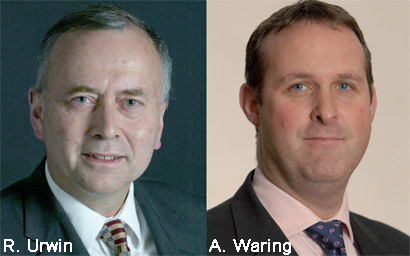Pension funds that are neither big nor small would benefit from appointing an external, delegated CIO. Angele Spiteri Paris speaks to Andrew Waring of the Merchant Navy Officers Pension Fund which has recently appointed Roger Urwin to this role.
Running a pension fund is not easy, especially when the fund is neither big nor small – you do not have sufficient resources to hire your own internal experts but the assets still need to be managed efficiently for them to perform.
Andrew Waring, chief executive at the Merchant Navy Officers Pension Fund (MNOPF), is keenly aware of this problem, which is why it brought in Roger Urwin, global head of investment content at Towers Watson, as its delegated chief investment officer (CIO).
Waring explains that this set-up draws clear lines of responsibility and accountability. Furthermore, he says: “Our delegated CIO is helping us to be more nimble and take advantage of investment opportunities.”
Urwin explains further: “In a traditional pension fund set-up, changes in the manager line-up are discussed and agreed by the trustee board or the investment committee. Such decisions usually have to go through several sifts of information before people arrive at
a conclusion.”
This obviously results in a protracted process. He continues: “The delegated chief investment officer structure involves an alternative way of tackling this, where the delegated CIO is assigned full power of attorney to make decisions of that sort on behalf of the pension fund.”
He says that in the traditional model, the shortest time it would take to make a decision to change an investment manager is two months, and most times it would “drag on”.
But at the MNOPF, the fund can make such a change within a month, says Urwin.
Waring explains the way the delegated CIO and the pension fund’s trustee board work together to produce the fund’s investment strategy.
“The pension fund trustees add value on a strategic level,” he says. “The CIO advises the trustees on asset allocation within the risk framework of the fund. The trustee board agrees the asset classes and the strategic ranges within them. The rest of the decisions are delegated to the CIO.
“We don’t take any short-term tactical decisions and neither does our CIO – they’re usually more medium-term movements made within our risk budget.”
Waring says that as long as any investment opportunity eyed by the chief investment officer is within the fund’s agreed risk budget and asset allocation, then the choice to invest or not is at the CIO’s discretion.
This way of doing things is arguably more efficient than other delegated models where the appointed CIO has to refer to the trustees on every investment decision.
Waring says: “The delegated CIO has a mandate to fulfill and to hire and fire managers as he sees fit, within the risk framework agreed. Which makes sense. As the investment landscape becomes more complex – it makes things difficult to do on your own.”
Waring says that the fund’s performance, which improved significantly in 2010, is proof that the new set-up worked to its advantage. “The new section of the fund was down 12.8% at the end of March 2009, while in 2010, our new section was up 29.4%, with the CIO holding his nerve and taking advantage of credit opportunities during the recovery,” he says.
Both Waring and Urwin say that the pension fund is looking at a variety of investment themes going forward.
Emerging market debt is one of the most prevalent. “We invested 2.5%, about £2bn (€2.2bn) of the new section of the fund in local currency emerging market debt,” says Waring. “We do currency overlay so 60 to 65% of our currency exposure is hedged away.”
According to Urwin, equities are a “clunky” way of getting exposure to the emerging markets theme, which is why he says the fund prefers the currency and debt route.
He says the MNOPF will also consider the changing structure of hedge funds and look more closely at their use as a more specialised area of investment opportunity.
By appointing a delegated CIO, Waring says: “I’d like to think that we’ve set a new benchmark for decision-making within pension funds and governance. For funds with £5bn in assets, this type of solution offers a way of controlling the risk budget and allows you
to leverage the resources you have available.”
Urwin agrees. “It [the development of more delegated CIO structures] is going to be a size-driven movement,” he says, adding that the first range of pension funds looking at this will be those with £500m to £5bn in assets under management.
He explains that it is difficult for a fund the size of the pension fund to justify having an in-house team, and when the money was managed in-house, it struggled.
Waring says: “Until the 90s, the MNOPF ran all the money in-house. Then it began to outsource the management of the fund over the next ten years. Before appointing the delegated CIO we still had some in-house investment capability. But I wanted to complete the outsourcing exercise, to create true accountability and responsibility for the CIO.”
Urwin says: “Some claim that when more than one person is in charge, no one is really in charge. So the delegated CIO structure gets rid of any grey areas of responsibility.”
Before the delegated chief investment officer arrangement was put in place, Waring says there was some confusion as to who had ultimate responsibility for investment decisions.
“There was a lack of responsibility and accountability. By removing the in-house investing capability, outsourcing and appointing the delegated CIO, we have solved this issue,” he says.
©2011 funds europe





